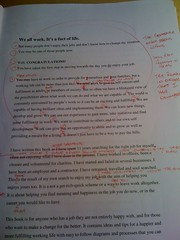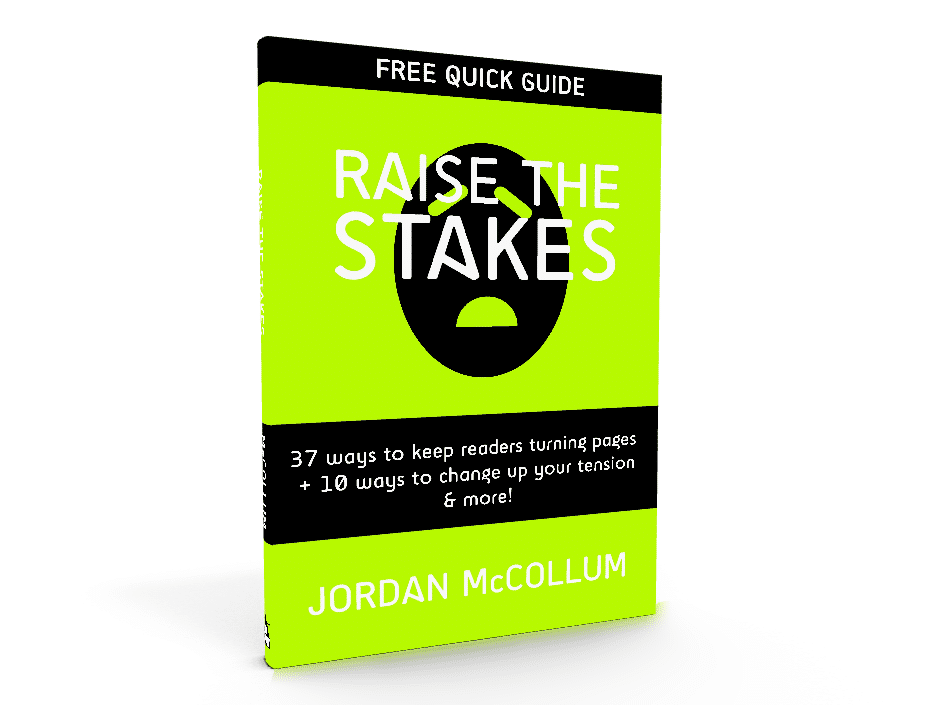A couple weeks ago, we looked at misplaced modifiers\. One of my favorite examples allegedly comes from a medical transcription (but I’ve also seen it credited to a  police blotter):
police blotter):
A man was bitten by a bat walking down the street on his thumb.
Modifiers—adjectives, adverbs, prepositional phrases, even participial phrases—should usually come as close to the word they’re modifying as they can. While we can (eventually) figure out the man was bitten on his thumb, that sentence says he was “walking down the street on his thumb.” (In fact, it says the bat was walking down the street on his thumb. The bat’s? The man’s? The world may never know!)
So we looked at some examples of dangling & misplaced modifiers—but sometimes it’s a heck of a lot easeire to learn with the answers, right?
There are multiple correct answers to all these.
Sensing her brother was about to pounce, he bent his knees, ready to jump at her.
The Problem: Okay, this was was a little ambiguous because we used pronouns. There are only supposed to be two people involved in this sentence, “her” and “her brother.” Here’s what I was going for:
Sensing her brother was about to pounce is supposed to be modifying “her.” What is she doing? Sensing (something). If she’s doing the sensing in the first clause, she’s supposed to be the subject of the second clause.
Instead (what I intended), the next clause is he bent his knees. Suddenly the brother is the subject of the sentence. Was he the one sensing he was about to pounce on her? Of course not.
The Fix: when we rephrase this, we need to make her the subject of the sentence, or get rid of the first clause altogether. Possibilities:
- Sensing her brother was about to pounce, she braced herself. He bent his knees, ready to jump at her.
- He bent his knees, ready to jump at her. (Doing away with the first clause altogether. If we’re in his POV, this version is more appropriate.)
(Now, if you thought “he” was a third party, that might be a different story.)
He couldn’t believe she was standing there after their conversation yesterday doing the dishes on the sidewalk.
 The Problem: The way this is phrased, their conversation took place yesterday (okay). The conversation might have been yesterday while she was doing dishes on the sidewalk. Or she might be standing there doing dishes on the sidewalk today. Either way, dishes on the sidewalk?
The Problem: The way this is phrased, their conversation took place yesterday (okay). The conversation might have been yesterday while she was doing dishes on the sidewalk. Or she might be standing there doing dishes on the sidewalk today. Either way, dishes on the sidewalk?
The Fix: First, we have to decide how things actually happened. Here are some possible scenarios:
- He couldn’t believe she was standing there on the sidewalk after their conversation while doing the dishes yesterday. (The time and place of each conversation are now clear: the conversation was during doing dishes yesterday, and now she’s standing on the sidewalk.) (Yesterday could also come a little earlier in the sentence.)
- After their conversation yesterday while doing dishes, he couldn’t believe she was standing there on the sidewalk.
Now, if she’s actually doing dishes on the sidewalk . . .
The “while” is a big helper, too! But if you stick it in the original sentence—oy! He couldn’t believe she was standing there after their conversation yesterday while doing the dishes on the sidewalk. It clears up the ambiguity, but I don’t think that’s the meaning we want—their conversation was yesterday while they were on the sidewalk, doing dishes?
At the age of seven, his father told him the truth.
The Problem: Remember that modifiers generally come closest to what they’re modifying—and at the beginning of a sentence, this is always the case. Grammatically speaking, this construction actually says the father was seven years old when he told him (the son) the truth. A bit young for fatherhood, eh?
Yes, a reader can figure out that we mean the son was seven here, but sensitive readers and grammarians will be pulled out of the story. Plus, do you want someone to have to “figure out” your meaning?
The Fix is pretty straightforward.
- His father told him the truth when he was seven.
Now, someone who is purposefully trying to misread your sentence might take that as ambiguous or misplaced, but it’s now closest to “him.” And honestly, if someone is purposefully trying to misread your writing, they’re probably not the best person for the job of a critique partner or editor?
Running from the scene, the horror clung to his mind.
The Problem: Again, it’s that initial first element. It modifies the subject of the sentence. The subject here is “the horror,” so this construction means the horror was running from the scene.
This story definitely has my attention . . .
The Fix: as always, is to move the elements around to get the modifier closest to what it’s modifying. This means either moving it or changing the subject of the sentence:
- The horror clung to his mind as he ran from the scene.
- Running from the scene, he tamped down the horror still clinging to his mind.
“As mayor of Park City, people often ask me . . . “
(I forget the rest of the sentence, but that was an actual commercial. Agh!)
The Problem: This construction, once again, makes mayor of Park City = people. And yes, humans are mayors of Park City, but usually not collectively and simultaneously.
The Fix: Move! those! modifiers!
- People often ask me as mayor of Park City . . .
- As mayor of Park City, I’m often asked . . .
Note that the second solution is (gasp!) passive voice. While it’s usually something to be avoided we want to avoid, passive voice does have an actual, grammatical function and a useful place in the language.
“At 26 ounces, you’ll find yourself drinking more.”
(Another actual commercial)
The Problem: At 26 ounces, you’ll have more problems than how much to drink. That’s taking the dieting a bit far, don’t you think?
The Fix:
- With a 26 ounce capacity, this cup will help you drink more. (I’m sorry, is this the problem or the solution?)
- You’ll find yourself drinking more with this 26-ounce cup.
“One morning I shot an elephant in my pajamas. (How he got into my pajamas I’ll never know.)”
Thank you, Groucho.
 The Problem: This is obviously quite intentional. If you want to set up a joke this way, go for it!
The Problem: This is obviously quite intentional. If you want to set up a joke this way, go for it!
The Fix ruins the joke, but here you go:
- One morning while still in my pajamas, I shot an elephant.
We tiptoed over the ice in our heavy boots, which had begun to crack.
The Problem: Finally we’re moving away from the initial modifiers to the final ones. These can still be tricky! Here, which had begun to crack comes closest to our heavy boots. It’s not much of a stretch to say they’re both part of the prepositional phrase—which means that the boots are the only candidates for cracking.
While that’s a problem, it’s probably not the right problem for the writer.
The Fix: Move that modifier! Here we can collapse the phrase into a single word, maybe a hyphenation:
- We tiptoed over the cracking ice in our heavy boots.
- We tiptoed over the now-cracking ice in our heavy boots.
- (A most interesting option) Our heavy boots tiptoed over the ice. A sharp creak ripped through the air. A fissure zigzagged through the solid white below us.
If you’ve got a problem with the last one, I suggest studying up on metonymy. And if that doesn’t help, you’d probably enjoy Dr. Seuss’s story about haunted pants, “What Was I Afraid Of?”
“McCance was found shot to death by her family Monday afternoon at her southern Wake County home.”
(Actual news article.)
The Problem: Um, not sure what the problem was, but whatever it was, her family shot her to death over it.
Possibly that’s what they meant. Probably it isn’t.
The Fix:
- McCance was found by her family Monday afternoon, shot to death at her southern Wake County home.
- Shot to death, McCance was found by her family Monday afternoon at her southern Wake County home.
- McCance’s family found her Monday afternoon, shot to death at her southern Wake County home.
There are lots more.
“Nearly six months after taking office, Gov. Beverly Perdue’s political honeymoon is over.”
(Actual news article.)
The Problem: The initial element, nearly six months after taking office, modifies the subject of the sentence—but the tricky thing here is that good ol’ Bev is not the subject of the sentence—her political honeymoon is.
The Fix: drop that possessive and make sure the governor is the subject of the sentence, or rephrase.
- Nearly six months after taking office, Gov. Beverly Perdue has passed her political honeymoon.
- Nearly six months after she took office, Gov. Beverly Perdue’s political honeymoon is over.
Why does the second one work? That little change from “taking” to “she took.” The “taking” is clearly dependent on the subject of the sentence (originally her political honeymoon), while “she took” has its own subject.
“As a parent, the so-called “Halo killer” may have you nervously watching your kids as they jab at their joysticks.”
The Problem: the so-called “Halo killer” is now a parent.
Also, two as’s in the same sentence?
The Fix: Do we need “as a parent” at all?
- The so-called “Halo killer” may have parents nervously watching their kids as they jab at their joysticks. (May introduce other ambiguity problems.)
- The so-called “Halo killer” may have you nervously watching your kids as they jab at their joysticks.
“After grounding her grandson, Allen Gann, from playing games the night before for not doing his chores, he sat down and played a full day’s worth, including Resident Evil, Smackdown vs. Raw and Midnight Club 2.”
(Same article as the previous.)
The Problem: This one is so convoluted that it may be a little hard to see the problem. (Were it not for the other dangling modifier from the same example, I’d say the reporter just got a little lost in this sentence.)
Okay. Let’s simplify this a little by taking out some of the modifiers that are getting in the way of the problem. The first clause of the sentence begins After grounding her grandson, Allen Gann. Allen Gann = grandson, so we’ll drop the appositive, and the prepositional phrases we’ll ignore for right now:
After grounding her grandson . . . , he sat down and played.
This goes back to the same problem as #1. Unless there’s some other “he” here (Grandpa?) who sat down and played after grounding the female third person POV character’s grandson, we’re all messed up.
The Fix: Make grandma the subject of the sentence, or make the grandson the subject of the initial dependent clause:
- After grounding her grandson, Allen Gann, from playing games the night before for not doing his chores, Grandma didn’t notice when he sat down and played a full day’s worth, including Resident Evil, Smackdown vs. Raw and Midnight Club 2.
- After being grounding (by his grandmother) from playing games the night before for not doing his chores, Allen Gann sat down and played a full day’s worth, including Resident Evil, Smackdown vs. Raw and Midnight Club 2.
- Realistically, the best fix is to break this unwieldy thing down! Grandma grounded her grandson, Allen Gann, from playing games (because he failed to do his chores). However, the following day, Gann sat down and played a full day’s worth, including Resident Evil, Smackdown vs. Raw and Midnight Club 2.
Much better!
Work better on paper? Download the original worksheet as a PDF and print! Can’t get enough? Lots more examples to play with!
Photo credits: tools—HomeSpot HQ, dirty dishes—Teresia;elephant—Roger; video games—w?odi



 One of these drudgerous tasks was to collect all the sentences that used a number of
One of these drudgerous tasks was to collect all the sentences that used a number of 



